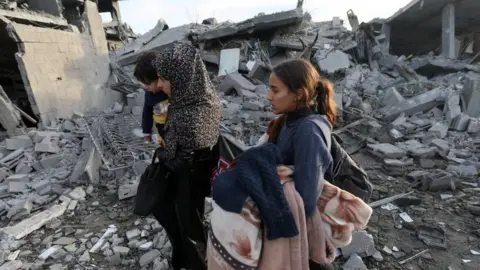Israel Gaza: Biden says Israel must protect vulnerable in Rafah
 Reuters
ReutersUS President Joe Biden has said civilians who are "packed" into Rafah in the Gaza Strip are "exposed and vulnerable" and must be protected.
Israel must make "credible" efforts to protect the more than one million Palestinians sheltering in the southern Gazan city, he said.
Rafah has come under heavy Israeli air strikes in recent days, with a number of casualties reported.
A Palestinian doctor told the BBC people in Rafah were living in fear.
Last week, Israel's Prime Minister Benjamin Netanyahu announced that he had ordered troops to prepare to expand its ground operation to Rafah. He vowed to defeat Hamas gunmen hiding in the city.
UN human rights chief Volker Türk said any assault would be "terrifying" and many civilians "will likely be killed".
More than half of the Gaza Strip's population of 2.3 million is now crammed into the city on the border with Egypt, which was home to only 250,000 people before the war between Israel and Hamas erupted in October.
Many of the displaced people are living in makeshift shelters or tents in squalid conditions, with scarce access to safe drinking water or food.
Israel's military launched its operations in the Gaza Strip after at least 1,200 people were killed in southern Israel on 7 October by Hamas-led gunmen, who also took 253 people hostage.
A number of those hostages were later released but Israel says 134 are still unaccounted for.
Some 28,473 Palestinians have been killed and more than 68,000 wounded in Gaza since 7 October, according to the Hamas-run health ministry there.
On Sunday, Israel's military said two male Israeli-Argentine hostages had been rescued during a raid in Rafah.
President Biden again appealed for the protection of Rafah civilians after his meeting with Jordan's King Abdullah in Washington on Monday.
He said any major military operation in the city "should not proceed without a credible plan for ensuring the safety" of those living there.
"Many people there have been displaced, displaced multiple times, fleeing the violence to the north and now they're packed into Rafah, exposed and vulnerable.
"They need to be protected. And we've also been clear from the start, we oppose any forced displacement of Palestinians from Gaza."
Last week, the White House said it would not support major Israeli operations in Rafah without due consideration for the refugees there.
Meanwhile, Gaza's Hamas rulers said there could be "tens of thousands" of casualties in Rafah, warning that any operation would also undermine talks about a possible release of Israeli hostages held in the territory.
The head of Israel's intelligence agency, David Barnea, CIA chief William Burns and Qatari Prime Minister Mohammed bin Abdulrahman Al-Thani met Egyptian officials in Cairo on Tuesday for further talks about a Gaza truce proposal, according to AFP news agency, which cited Egyptian outlet Al-Qahera News. The officials' planned meeting was also reported in Israeli media.
Benjamin Netanyahu last week rejected Hamas's proposed terms for a ceasefire, saying "total victory" in Gaza would be possible within months.
Alongside the US, a number of countries and international organisations have warned Israel against launching its planned offensive.
UK Foreign Secretary David Cameron on Monday said Israel should "stop and think seriously" before taking further action in Rafah.
EU's foreign policy chief Josep Borrell urged allies of Israel to stop sending weapons, as "too many people" were being killed in Gaza.
Last week, Saudi Arabia warned of "very serious repercussions" if Rafah was stormed.
Correction 14 February 2024: This article originally included a sentence which described Rafah as the only open point of entry for humanitarian aid into Gaza. This is inaccurate because humanitarian aid has also been entering Gaza through the Kerem Shalom crossing.
